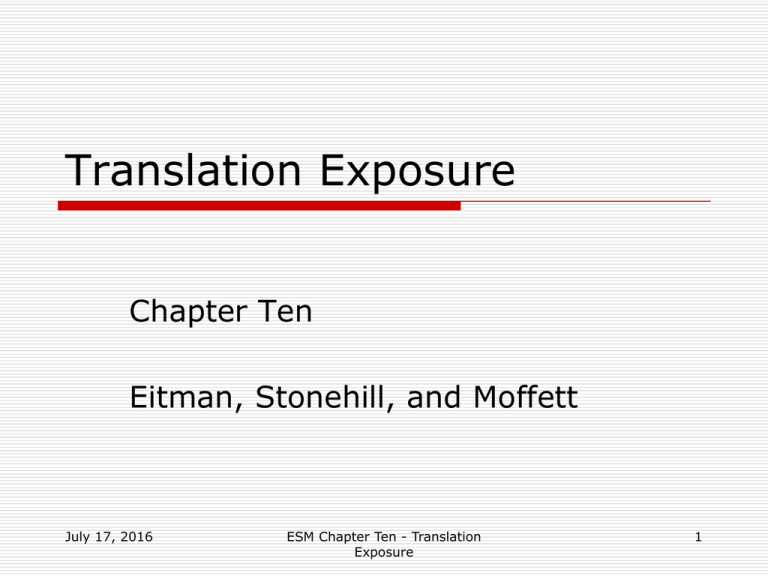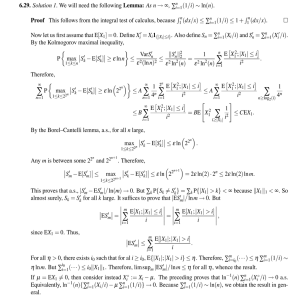Translation Exposure Chapter Ten Eitman, Stonehill, and Moffett July 17, 2016
advertisement

Translation Exposure Chapter Ten Eitman, Stonehill, and Moffett July 17, 2016 ESM Chapter Ten - Translation Exposure 1 Translation exposure foreign currency financial statements different line items translated at different exchange rates term of different assets & liabilities translated at historical rates current rates July 17, 2016 ESM Chapter Ten - Translation Exposure 2 Foreign subsidiaries Integrated foreign entity Extension of parent firm Cash flows denominated in functional currency Supplier to the parent firm Self-sustaining foreign entity Operates independently in foreign environment Cash flows denominated in foreign currency Supplied by local economy Supplies local economy July 17, 2016 ESM Chapter Ten - Translation Exposure 3 Functional currency Primary economic environment of the firm July 17, 2016 ESM Chapter Ten - Translation Exposure 4 Balance sheet cash market securities receivables inventories fixed assets July 17, 2016 payables accruals fixed debt common stock pd in capital acc. Retained earnings ESM Chapter Ten - Translation Exposure 5 Income statement Revenues (Costs) (COGS) (Operating costs) (Depreciation) (Taxes) Net Income retained distributed July 17, 2016 ESM Chapter Ten - Translation Exposure 6 Types of foreign firms integrated foreign entity one which operates as an extension of the parent firm functional currency is that of the parent firm self-sustaining foreign entity one which operates independently of the parent firm functional currency is that of the foreign country July 17, 2016 ESM Chapter Ten - Translation Exposure 7 Determining the functional currency intercompany transactions large volume - use parent currency small volume - use foreign currency large volume determined by a large split between revenues and costs sales price responsive more to exchange rate changes costs due to importing components from parent company interest costs on financing in home currency July 17, 2016 ESM Chapter Ten - Translation Exposure 8 Current method (Historical) balance sheet items at current rate income statement items exchange rate in effect on dates incurred average exchange rate over the period distributions - rate on date of payment equity equity & pd in capital historical rates retained earnings at historical cum translation adj - on consolidated BS July 17, 2016 ESM Chapter Ten - Translation Exposure 9 Rationale for using current method if relative PPP holds real assets depreciate in foreign currency terms real assets retain constant value in home currency terms monetary (financial) assets do not have time to depreciate if relative PPP does not hold case is the same as that of a firm in an inflationary or deflationary climate July 17, 2016 ESM Chapter Ten - Translation Exposure 10 Temporal balance sheet items - stock statement monetary assets & liabilities current rate non-monetary assets & liabilities - historical rate inventories may be assigned as current assets income statement items - flow statement most items average rate except cashflows associated with non-current assets or liabilities translated - historical rate depreciation July 17, 2016 ESM Chapter Ten - Translation Exposure 11 Temporal Assets Liabilities Cash marketable securities accounts receivable inventories fixed assets July 17, 2016 accounts payable notes payable accruals long-term liabilities equity ESM Chapter Ten - Translation Exposure 12 Temporal revenues (cost of goods sold) (operating costs) (amortization) (depreciation) (Taxes) Net Income July 17, 2016 ESM Chapter Ten - Translation Exposure 13 Rationale for using temporal method This reflects normal evaluation Book values are used monetary (financial) assets do not have time to depreciate if relative PPP does not hold case is the same as that of a firm in an inflationary or deflationary climate July 17, 2016 ESM Chapter Ten - Translation Exposure 14 Balance Sheet Hedge Must match foreign denominated liabilities to assets Borrow the expected change in equity Based on an expected future spot Convert to home currency now Sell assets equivalent to change in equity Convert to home currency now July 17, 2016 ESM Chapter Ten - Translation Exposure 15 Current cash market securities receivables inventories fixed assets July 17, 2016 payables accruals fixed debt common stock pd in capital acc. Retained earnings ESM Chapter Ten - Translation Exposure 16 Temporal Assets Liabilities Cash marketable securities accounts receivable inventories fixed assets July 17, 2016 accounts payable notes payable accruals long-term liabilities equity ESM Chapter Ten - Translation Exposure 17 Justifying a Balance Sheet Hedge Liquidation of current foreign operations in the short to medium term Maintenance of debt covenants Subsidiary operating under hyperinflation July 17, 2016 ESM Chapter Ten - Translation Exposure 18


